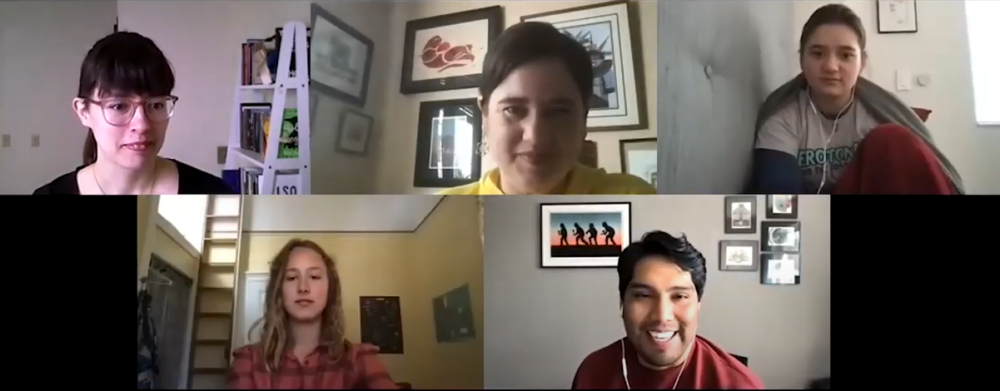Read more from the Foundation’s 2021 Annual Report on Donor Impact.

first discussion on childhood. (Photo courtesy of SPL YouTube channel)
“People are still telling stories around the campfire,” said D.A. Navoti. “It’s just on Zoom now.”
At a time when stories — and the connections they create — were urgently needed, the Library launched a new donor-supported Guest Curator program. Navoti, a multidisciplinary writer and storyteller, and Olaiya Land, a pleasure and empowerment coach, were the inaugural curators. They each developed a series of five virtual discussions with writers and community members throughout 2021, centering voices from historically excluded communities.
The program was designed to introduce new and diverse perspectives on Library programming, said Stesha Brandon, literature and humanities program manager for the Library’s Community Engagement Services.
“These curators are folks who have been doing amazing work around town for years, and the program gives the Library an opportunity to feature their voices and celebrate the topics they are interested in,” Brandon said.
Curators had complete control over their series and were compensated for their work. Land appreciated the leeway to tackle challenging issues like sexuality and race. After the past several years, she observed, such conversations are sorely needed.
“People are ready to talk about more real topics, and explore them and find meaning,” Land said. Her series was about radical self-acceptance as a form of activism, building on a theme she noticed in her own life and societally during the pandemic. Every part of her series focused on welcoming women, people of color, LGBTQIA+ people, those with neurodivergence or different body types, and others often excluded from traditional programming.
Both Land and Navoti wanted everyone involved to be able to bring their own lived experiences to the virtual campfire. Navoti sought a theme to unite people across generations and cultures. His subject, the trials of growing up, was both weighty and light-hearted. “Humility or embarrassment is a great mix for bringing people together,” he noted.
More than 300 people viewed the Guest Curator events live. Navoti and Land both heard positive feedback from the writers, activists, and attendees who appreciated the chances to share vulnerable feelings, have unfiltered conversations, and join spaces that felt intentional, welcoming, and safe.
Many attendees joined from communities that don’t usually access the Library, and hundreds more people have viewed the event videos on YouTube. Land has also used the audio from her series in her Lionesse podcast.
The experience will help future Guest Curators and other Library programs reach overlooked audiences, Navoti said. “There are opportunities for stories to live outside the walls of the Library and go into the communities themselves.”
The full Guest Curator series are available to watch here.
